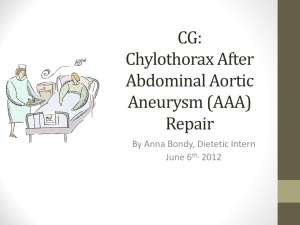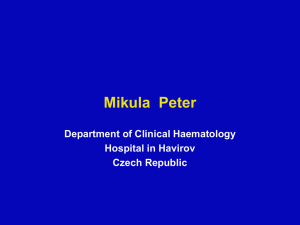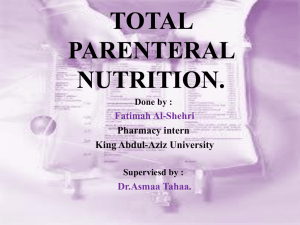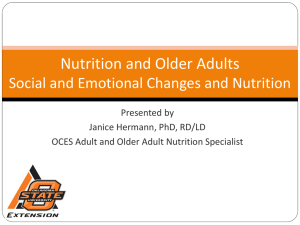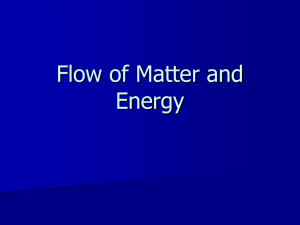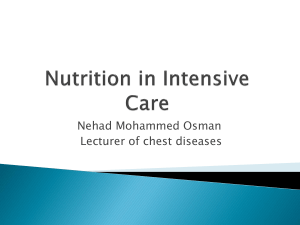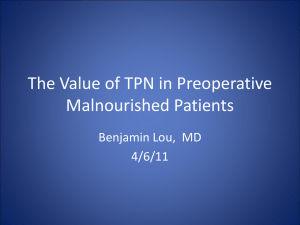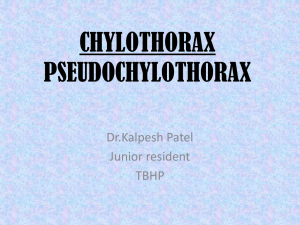Chyle Leak: Nutritional Implications & Case Study
advertisement
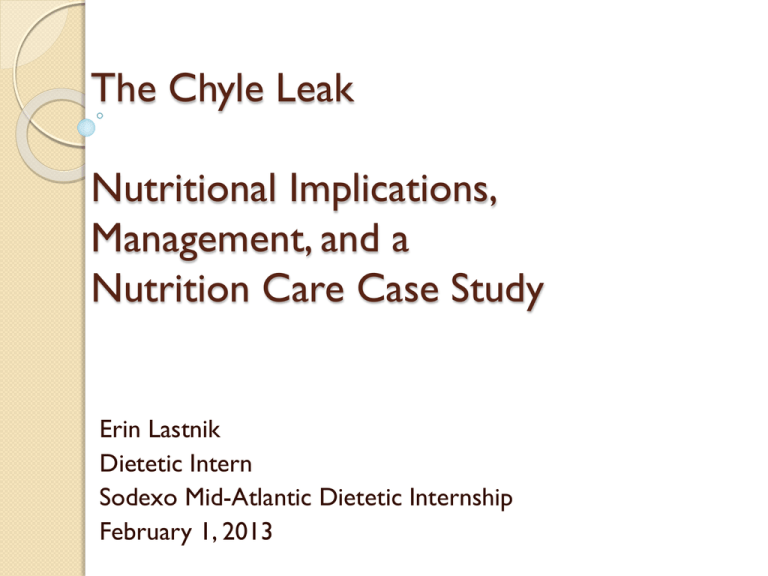
The Chyle Leak Nutritional Implications, Management, and a Nutrition Care Case Study Erin Lastnik Dietetic Intern Sodexo Mid-Atlantic Dietetic Internship February 1, 2013 Objectives Identify two nutritional implications of a chyle leak. Explain the role of chyle in fat absorption. Identify three nutritional interventions for a chyle leak. Introduction IH is a 62 year old female African American Graduated high school, married with six children, retired Admitted to St. Joseph’s on 11/24/12 Medical Background Past Medical History ◦ Type 2 diabetes, CVA x2, CAD s/p CABG x4, HTN, anemia, CKD Stage 3, one C-section, hysterectomy CABG x4 was at St. Joseph’s on 10/29/12 ◦ Rehabilitation center for three weeks Left pleural effusion Three admissions for thoracentesis Admission 11/24/12 IH admitted with SOB, chest discomfort ◦ Dx: Pleural Effusion Physical ◦ Reduced muscle strength, slow speech, trace edema Medications PTA ◦ Aspirin, Colace, Doxycycline, Levemir, Lexapro, Plavix, Simvastatin, Toprol XL, Oxycodone, Reglan Labs WNL ◦ Albumin 2.6 g/dL; Creatinine 1.2 mg/dL Initial Findings Chest x-ray and thoracentesis with fluid analysis ◦ Bilateral chylothorax Definitions Chyle ◦ White, milky fluid containing triglycerides, protein, lymphocytes and electrolytes Chylothorax ◦ Collection of chyle and lymphatic fuid in the pleural cavity Anatomy and Digestion Thoracic duct ◦ Cysterna chyli Long-chain Triglycerides (LCT) ◦ Enzymes ◦ Micelle Re-esterification Chylomicron Short chain/Medium chain Triglycerides (SCT/MCT) ◦ No micelle or chylomicron ◦ Mucosa Portal vein ◦ Evidence in lymphatic system Etiology and Pathology Primary Etiologies ◦ Congenital, obstruction, lymphagiectasis Secondary ◦ Head/neck, thoracic, pancreatic, esophagus sx Hours to months before identified Chylothorax, chylous ascites, chylopericardium Dx ◦ TG >100 mg/dL ◦ TG 50-100 mg/dL requires chylomicrons Nutritional Implications Hypovolemia ◦ Hypokalemia, hyponatremia, hypocalcemia Protein loss ◦ Hypoalbuminemia Malabsorption ◦ Caloric, vitamins, medications Immunosuppression Management of a Chyle Leak Conservative Interventions Very low fat diet ◦ <10 - <20 g/day Caloric loss of fat: MCT oil/elemental formula MCT oil does NOT prevent EFAD Enteral Nutrition (EN) ◦ Elemental/Semi-elemental formula Peptamen® Total Parenteral Nutrition (TPN) ◦ Chyle flow ◦ Bowel rest ◦ Bowel atrophy/infection Surgical Interventions Persistent leaks: >500 mL/day for two weeks Thoracic duct ligation Thoracic duct embolization Fibrin glue Treatment and Hospital Course Initial Visit 11/26/12: Assessment Thoracentesis Poor appetite PTA ◦ Felt it was increasing ◦ “Picky eater” ◦ Nausea Reported weight loss ◦ Unsure of how much ◦ ~10# per computer records Labs: BUN, Creatinine, Glucose Estimated needs ◦ 1425 – 1600 kcal (25 – 28 kcal) ◦ 57 – 74 g protein (1 – 1.3 g/kg) Initial Visit: Diagnosis Suspected Suboptimal PO intake R/T Poor appetite and nausea AEB pt consuming 0 – 25% per computer records Initial Visit: Interventions Meals and Snacks ◦ Recommend continue current diet (Moderate Consistent CHO), consider liberalizing to Regular if PO intake <50% Medical Food Supplement ◦ Recommend Resource Health Shake SF TID with meals (600 kcal, 24 g protein) Goal: PO intake >50% Initial Visit: Monitor/Evaluate PO intake Labs GI Status Weight Follow-up 11/29/12: Assessment Fluid analysis revealed bilateral chylothorax ◦ Bilateral pigtail catheters OR 12/3/12 ◦ Thorascopic decortication with bronchoscopy “Zero Fat” diet with Health Shakes Grand-daughter present during interview to confirm poor PO intake Estimated needs ◦ 1425 – 1600 kcal (25 – 28 kcal) ◦ 74 – 103 g protein (1.3 – 1.8 g/kg) First Follow up: Diagnosis Suspected Suboptimal PO intake – ongoing Suspected Suboptimal PO intake – confirmed ◦ Inadequate Oral Intake R/T Nausea and decreased appetite AEB 0% of meals per computer records and family member ◦ Altered GI Function R/T Change in accessory organ function AEB Fluid analysis revealed chyle leak First Follow-up: Interventions Meals and Snacks ◦ Recommend 20 g Low Fat diet Medical Food Supplement ◦ Recommend change supplement to Resource Breeze TID due to zero-fat content (750 kcal, 27 g protein) Enteral Nutrition (EN) ◦ Recommend Vital AF 1.2 @ 55 mL/hr (1584 kcal, 99 g protein) Parenteral Nutrition (PN) ◦ Recommend Standard PPN (1540 kcal, 100 g CHO, 100 g protein, 80 g lipid) First Follow-up: Monitor/Evaluate Plan of care PO Intake GI Status Weight I&Os Second Follow-up 11/30/12: Assessment PPN initiated night of 11/29/12 Central line plan Remained on “Zero Fat” diet ◦ PO intake was still 0% ◦ Resource Breeze ordered Second Follow-up: Diagnosis Suboptimal Oral Intake – ongoing Second Follow-up: Interventions PN ◦ If TPN initiated, recommend initiate at Amino Acids 15% 550 mL = 75 g protein Dextrose 70% 250 mL = 175 g dextrose Lipid 20% 200 mL = 20 g lipid Provides 1295 kcal ◦ Replete electrolytes PRN, pt is a refeeding syndrome risk Meals and Snacks ◦ Recommend continue “Zero Fat” diet per MD Second Follow-up: Monitor/Evaluate PO intake Labs GI Status Weight Plan of care Follow-ups: 12/1, 12/4, 12/5, 12/7, 12/10, 12/13 PPN 11/29 ◦ K+ drop 4.1 – 3.8 TPN 12/4 (POD #1) ◦ K + drop 3.8 – 3.6 NPO post TPN initiation Elevated BG levels ◦ 10 units insulin in TPN bag; 50 units Lantus Prealbumin: 11 mg/dL Triglycerides: 64 mg/dL Hypocalcemia ◦ 8.7, 8.4, 8.2, 8, 7.8 mg/dL Follow-ups 12/1 – 12/13 Continued Recommendations ◦ Increase Amino Acids to 570 mL = 85 g ◦ Increase Amino Acids to 600 mL = 90 g (taken) Routine chest scans ◦ Decreased chyle accumulation ◦ Chylopericardium OR 12/12 ◦ Pericardiocentesis with pericardial drain ◦ PleurX catheter Follow-ups 12/15, 12/18, 12/19 Decreased drainage output; leak resolved? ◦ TPN stopped ◦ Regular diet ordered ◦ Bilateral pigtails removed Calorie Count ◦ 0%; 1 meal = 275 kcal, 11 g protein IH not meeting needs ◦ Recommendation for Glucerna 1.2 @ 55 mL/hr (1584 kcal, 79 g protein) ◦ Recommend reinitiate TPN at previous rate Follow-ups 12/20, 12/21, 12/24, 12/28 IH began to eat and had increased drainage ◦ TPN recommended to PA TPN reinitiated on 12/21 with previous formula ◦ TPN x3 weeks ◦ NPO Prealbumin: 13 mg/dL; 16 mg/dL Triglycerides: 141 mg/dL BG >200 mg/dL ◦ 20 45 65 units of insulin in TPN bage Discharge IH discharged on 1/2/13 ◦ Dx: Chylothorax TPN x3 weeks NPO PleurX catheter Pericardial drain removed Questions? References Bonner GM, Warren JM. A Review of the Nutritional Management of Chyle Leakage in Adults. Journal of Human Nutrition and Dietetics. 1998 (11) 105-114. Fahimi H, Casselman FP, Mariani MA, van Boven WJ, Knaepen PJ, van Swieten HA. Current Management of Postoperative Chylothorax. Ann Thorac Surg 2001;71:448-450. Gottschlich MM. The Science and Practice of Nutrition Support: A Case-Based Core Curriculum. Dubuque, IA: Kendall Hunt Pub Co; 2000; 481 – 485. Hakim NS, Papalois VE. Surgical Complications: Diagnosis and Treatment. London, England: Imperial College Press; 2007; 222 – 225. Maldonado F, Hawkins FJ, Daniels CE, Doerr CH, Decker PA, Ryu JH. Pleural Fluid Characteristics of Chylothorax. Mayo Clin Proc. 2009;84:129–133. McCray S, Parrish CR. When Chyle Leaks: Nutrition Intervention. Practical Gastroenterology 2011; 94; 12 – 22. McGrath EE, Blades Z, Anderson PB. Department of Respiratory Medicine, Northern General Hospital, UK. Chylothorax: Aetiology, Diagnosis and Therapeutic Options. http://www.pneumonologia.gr/articlefiles/chylothorax.pdf. Accessed 16 January 2013. Nyquist GG, Hagr A, Sobol SE, Hier MP, Black MJ. Octreotide in the Medical Management of Chyle Fistula. Otolaryngology– Head and Neck Surgery; 128, 6; 910 – 911. Pakula AM, Phillips W, Skinner RA. A Case of a Traumatic Chyle Leak Following an Acute Thoracic Spine Injury: Successful Resolution with Strict Dietary Manipulation. World Journal of Emergency Surgery 2011, 6:10. Scholz GA, Sirbu H, Semrau S,Anders K, Mackensen A, Spriewald BM. Persisting Right-sided Chylothorax in a Patient with Chronic Lymphocytic Leukemia: A Case Report. J Med Case Reports. 2011; 5: 492. Skouras V, KalomenidisI. Chylothorax: Diagnostic Approach. Curr Opin Pulm Med. 2010 Jul;16(4):387-93. Smoke A, DeLegge MH. Chyle Leaks: Consensus on Management?. Nutr Clin Pract. 2008; 23 (5): 529-532 Talwar A. Division of Pulmonary & Critical care medicine North-Shore University Hospital, Manhasset, NY. Chylothorax: Recent Advances. http://lungtherapeutics.com/appDocs/Chylothorax-web%20site.pdf. Accessed 17 January 2013. Timoney M. Department of Surgery SUNY Downstate/Kings County Hospital Center. Management of Chylothorax. http://www.downstatesurgery.org/files/cases/Cyhlothorax.pdf. Accessed 16 January 2013. Wakefield SC. ESPEN Congress. Specialized Oral or Enteral Nutrition Measures in Patients with Chyle Leaks. http://www.espen.org/presfile/Wakefield_2012.pdf. Accessed 17 January 2013.
